-
Friday, 21 September
Sabatini Building, Vaults Gallery
Museo Reina Sofía
6:30 pm – 7 pm
Janneke van der PuttenJanneke van der Putten is a Dutch performer and visual artist. Employing techniques learned during years of training, she uses her voice as an instrument in order to explore different environments physically, sonically and emotionally. Her work moves away from the usual modern parameters of amplification and synthesis, focusing instead on the body’s resonance in the here and now.
7 pm – 7:30 pm
Agnès PeMadrid-based musicologist of the non-common, Agnès Pe’s work transcends all genre boundaries. After her eclectic and overwhelming session in Archipelago’s first edition, this year she presents an intense performance where MIDI files will be twisted beyond recognition while generating new (a)rhythmic forms and structures. Low-fi and hi-physicality computer music with a playful and unstoppable attitude: all or nothing.
7:30 pm – 8 pm
HashigakariHashigakari take his name from Japanese noh theatre. Based in Madrid, their members David Area (electronics) and Tomás Gris (miscellaneous instruments and objects) focus on free improvisation and reductionism. They draw inspiration from the Onkyo Japanese music movement and the work of the likes of Wandelweiser, for whom silence is not only an aesthetic resource but also the origin of an event. Area and Gris run Ex-Nihilo record label and are also members of maDam ensemble, GRS collective, and Nanimo Quartet.
8 pm – 8:30 pm
Clara de AsísClara de Asís is a Spanish composer and guitarist based in France. Her performances highlight simplicity and active listening as means of music-making. Asís uses electroacoustics to manipulate combinations of objects, materials and sound sources from a minimal approach. Her last album, Do Nothing (2018), is a suite in which the sounds produced between two actions are let to “live” by themselves, with revealing results for the listener.
8:30 pm – 9:30 pm
Cedrik FermontBorn in former Zaire (Democratic Republic of the Congo), brought up in Belgium and currently based in Berlin, Cedrik Fremont went deep into the domains of electronic music and noise in 1989. His performance in Archipelago will consist of a session based on the research and dissemination of different experimental music scenes from a number of African and Asian countries. Fremont has curated several anthologies through his record label Syrphe and is the author of various essays, including Not your world music. Noise in South East Asia (2016), co-authored with Dimitri della Faie.
-
Sabatini Building, Garden
Museo Reina Sofía
7:30 pm – 8:30 pm
TutuBased in Barcelona, dj Gemma Planell (Tutu) has travelled extensively performing in some of the festivals (Atonal, TodaysArt, Sónar) that set how part of the music currently made in Europe is understood. Her sessions usually begin with recordings of bird noises and morning races, whose rhythmic patterns provide a base from which she builds a continuum of dark and intense textures. The starting point of her performance in Archipelago will be an outdoors sunset, a listening environment very different from that of electronic music clubs.
8:30 pm – 10 pm
ToukadimeToukadime means “to present” in Arabic. It is a term that can be frequently heard in many Maghrebi analogical recordings from the 20th century. Since 2011, it is also the name of a project by French djs Bachir and Krimau aimed at preserving and disseminating this sound heritage, which they have gathered together in an imposing vinyl series as well as in online digitisations, radio shows, and sessions for the dance floor as the one they will be presenting at Archipelago.
10:15 pm – 11:30 pm
Ammar 808Tunisian producer Sofyann Ben Youssef re-interprets traditional Maghrebi compositions from a futurist perspective, while he denounces the cruelty of frontiers and struggles to overcome separatism by valorising differences. In Archipelago he will be presenting the first release of his project Ammar 808, Maghreb United. In Maghreb United the hypnotic sound of the gasba and the zokra intermingle with the legendary 808 drum machine, a device essential for genres such as electro and techno, which are now well-established but were ground-breaking at their beginning.
-
Saturday, 22 September
Real Conservatorio Superior de Música
Performance on the organ of Manuel de Falla Auditorium
4:30 pm – 5:30 pm
Áine O'DwyerÁine O'Dwyer is an Irish harp player, singer, composer, improviser and visual artist with a reputation in experimental music for her unusual approach to organ. Her heterodox work explores the acoustic potential of the instrument without leaving aside the organ’s relationship with its habitual spatial contexts and their sacred dimension. In Archipelago, O’Dwyer will present a site-specific performance on the organ of Manuel de Falla Auditorium.
-
Sabatini Building, Auditorium
Museo Reina Sofía
6 pm – 7 pm
Tarawangsawelas + Rabih BeainiFrom Indonesia, Bandung-based Teguh Permana and Wisnu Ridwana will perform together their unique rendering of tarawangsa, a ritual and ceremonial music from Sunda, in West Java. They will play the tarawangsa (a two-stringed violin of sorts) and the jentreng (a seven-stringed zither), accompanied by the unclassifiable Lebanese artist Rabih Beaini, also known as Morphosis, who will process the duo’s sound and take it to new, unexpected paths.
-
Sabatini Building, Garden
Museo Reina Sofía
7:15 pm – 8:15 pm
Nadah El ShazlyCairo-based singer and multi-instrumentalist Nadah El Shazly’s first release, Ahwar (2017), has been critically acclaimed in the specialised media and is an excellent introduction to Cairo’s vibrating music scene. Yet to be discovered in Spain, in Archipelago Shazly will present the personal musical discourse that articulates her songs: impro strategies and electronic music intermingle with elements of 20th-century Arab folk music and do so without nostalgia, making the most of this heritage’s relevance and renovating power.
8:30 pm – 9:30 pm
ErrorsmithAfter a 13-year wait, we celebrate the release of the latest solo album of German musician Erik Wiegand (Errorsmith), Superlative Fatigue (2017). The album’s title, which refers to its extenuating creative process, could also describe the tiredness induced by the repetition of out-dated and predictable formulas in some music genres – something from which Errorsmith has always exceled at escaping. Wiegland is the creator of the Razor synthesiser – a cornerstone of the album sound – and member of MMM (together with Berghain’s resident dj Fiedel), and of Smith N Hack (together with Frank Timm from Soundstream)
9:45 pm – 11:15 pm
DJ LagGqom is a music genre from the suburbs of Durban, South Africa, which uniquely blends broken beats, percussive minimalism and a variety of elements from hip-hop, house and even maskandi (Zulu folk music). At his young age, Lwazi Asanda Gwala (Dj Lag) has managed to catapult this eminently local style to a global scale, thanks to overwhelming and effervescent sessions like the one that will be closing this edition of Archipelago.
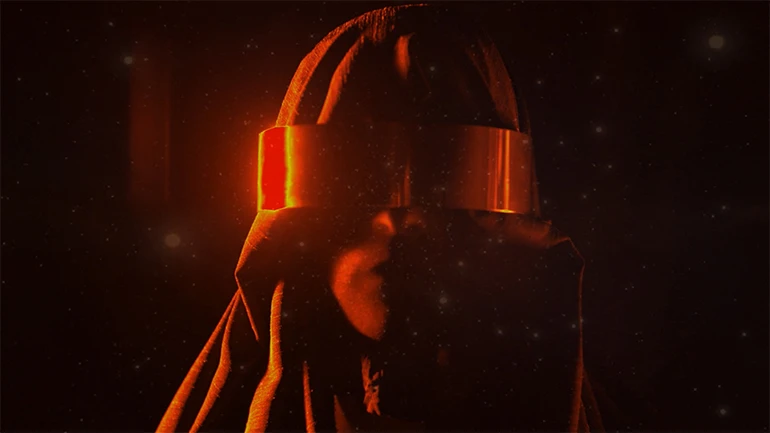
Held on 21 Sep 2018
In its second edition, Archipelago asserts its approach to listening as a form of both knowledge and aesthetic pleasure. Attendants are encouraged to approach the complexities of the cotemporary world not only through the ear, but also through the body, by absorbing sound with all their organs and bones.
This year the number of participant artists grows and the venues diversify: shows will be held at the Garden of Sabatini Building, the the Vaults Gallery and the Auditorium, as well as in the Real Conservatorio Superior de Música de Madrid, located next to the Museo.
If something characterised music at the beginning of the 21st century, it was a paralysis of sorts – an alleged incapacity to contribute something new to history, understood as a continuous linear progress. In order to overcome the institutionalisation affecting and somehow isolating experimentation, in 2018 new geographical references are being explored in a quest for the origins and echoes in folklore and popular traditions, a source from which innovation continuously feeds. Simultaneously, new forms of listening are being proposed that implicate the body through dance.
In Experimentalisms in practice. Music perspectives from Latin America (Oxford University Press 2018), authors Ana R. Alonso-Minutti, Eduardo Herrera, and Alejandro L. Madrid define music experimentation not as a universal concept but as a notion located in relation to the specific contexts where it emerges. Although experimentation can be understood as a synonym of quest – or as that which “has no limits”, according to Michael Nyman –, in recent years it has been burdened by predetermined formulas that are mostly derived from Eurocentric and English-speaking-centric conceptions. Such formulas seem to claim implicitly that all music expressions beyond their own sound and geographic limits lack the self-proclaimed capacity to look forward into the future in a progressive way.
This feeling of exhaustion – which has turned into a Zeitgeist – has also brought about a turn into the past: artists listen to the sound archive of the previous century with new ears, looking for alternatives to a canon built on the basis of already exhausted narratives and genealogies.
Without aiming at building a new hierarchy, the artists participating in this edition embody music proposals from different geographical locations and practices that help make known new historical contexts and projects, as well as new music futures.
With the technical support of
Laboratorio de Informática y Electrónica Musical-LIEM, Centro de Tecnología del Espectáculo-CTE, Instituto Nacional de las Artes Escénicas y de la Música-INAEM y Real Conservatorio Superior de Música de Madrid-RCSMM
Curatorship
Rubén Coll and José Luis Espejo
Organised by
Museo Reina Sofía
Sponsorship

Más actividades

Difficulty. Forms and Political Effects of Deviation in Writing and Contemporary Art
23 February – 14 December 2026 – Check programme
Difficulty. Forms and Political Effects of Deviation in Writing and Contemporary Art is a study group aligned towards thinking about how certain contemporary artistic and cultural practices resist the referentiality that dominates the logics of production and the consumption of present-day art. At the centre of this proposal are the concepts of difficulty and deviation, under which it brings together any procedure capable of preventing artistic forms from being absorbed by a meaning that appears previous to and independent from its expression. By ensuring the perceptibility of their languages, difficulty invites us to think of meaning as the effect of a signifying tension; that is, as a productive and creative activity which, from the materiality of art objects, frees aesthetic experience from the representational mandate and those who participate in it from the passiveness associated with tasks of mimesis and decoding.
The economy of the referential norm translates the social logic of capitalism, where insidious forms of capturing subjectivity and meaning operate. In the early 1980s, and adopting a Marxist framework, poet Ron Silliman highlighted how this logic entailed separating language from any mark, gesture, script, form or syntax that might link it to the conditions of its production, rendering it fetichised (as if without a subject) and alienating its users in a use for which they are not responsible. This double dispossession encodes the political strategy of referential objectivity: with no subject and no trace of its own consistency, language is merely an object, that reality in which it disappears.
The political uses of referentiality, more sophisticated today than ever before, sustain the neoliberal-extractivist phase of capitalism that crosses through present-day societies politically, economically and aesthetically. Against them, fugitive artistic practices emerge which, drawing from Black and Queer studies and other subaltern critical positions, reject the objective limits of what exists, invent forms to name what lies outside what has already been named, and return to subjects the capacity to participate in processes of emission and interpretation.
Read from the standpoint of artistic work, the objective capture of referentiality may be called transparency. Viewed from a social contract that reproduces inequality in fixed identity positions, transparent in this objectivity are, precisely, the discourses that maintain the status quo of domination. Opposite the inferno of these discourses, this group aims to collectively explore, through deviant or fugitive works, the paradise of language that Monique Wittig encountered in the estranged practices of literature. For the political potency of difficulty — that is, its contribution to the utopia of a free language among equals — depends on making visible, first, its own deviations; from there, the norm that those deviations transgress; and finally, the narrowness of a norm which in no way exhausts the possibilities ofsaying, signifying, referring and producing a world.
From this denouncement of referential alienation, fetishisation and capture, Difficulty. Forms and Political Effects of Deviation in Writing and Contemporary Art turns its attention to the strategies of resistance deployed by contemporary artists and poets. Its interest is directed towards proposals as evidently difficult or evasive as those of Gertrude Stein, Lyn Hejinian, Theresa Hak Kyung Cha, Kameelah Janan Rasheed, Kathy Acker, María Salgado and Ricardo Carreira, and as seemingly simple as those of Fernanda Laguna, Felix Gonzalez Torres and Cecilia Vicuña, among other examples that can be added according to the desires and dynamics of the group.
The ten study group sessions, held between February and December, combine theoretical seminars, work with artworks from the Museo Reina Sofía’s Collections and exhibitions, reading workshops and public programs. All these formats serve as spaces of encounter to think commonly about certain problems of poetics — that is, certain political questions — of contemporary writing and art.
Difficulty. Forms and Political Effects of Deviation in Writing and Contemporary Art inaugurates the research line Goodbye, Representation, through which the Museo Reina Sofía’s Studies Directorship seeks to explore the emergence of contemporary artistic and cultural practices which move away from representation as a dominant aesthetic-political strategy and redirect their attention toward artistic languages that question the tendency to point, name and fix, advocating instead for fugitive aesthetics. Over its three-year duration, this research line materializes in study groups, seminars, screenings and other forms of public programming.

CLINIC 2628. A Community of Writing and Research in the Arts
February – October 2026
Clinic 2628 is a project which supports and brings together writings which stem from the intention to offer a space and sustainable time for research work in art and culture. Framed within an academic context which is increasingly less receptive to the forms in which thinking happens and is expressed, the aim is to rescue the academic from its neoliberal trappings and thus recover the alliance between precision and intuition, work and desire. A further goal is to return writing to a commons which makes this possible through the monitoring of processes and the collectivisation of ideas, stances, references and strategies.
The endeavour, rooted in a collaboration between the Museo Reina Sofía’s Studies Directorship and the Artea research group, via the i+D Experimenta project, is shaped by three annual editions conceived as spaces of experimentation, discussion and a demonstration of writings critical of what is put forward by today’s academia.
What forces, forms and processes are at play when writing about art and aesthetics? In academia, in museums and in other cultural institutions, the practice of writing is traversed by productivist logics which jeopardise rhythms of research and experimentation. The imposition of both scientism inherent in the structure of “the paper” and the quantifying of results which demand a criterion of quality and visibility sterilise and smoothen, from the outset, the coarseness that is particular to writing understood from the concrete part of language: phonic, graphic, syntactic and grammatical resistance connecting the language user to the community the language unites and activates. They also sterilise the roughness enmeshed in the same desire to write, the intuitive, clear and confusing pathways that once again connect the writer to those reading and writing, participating in a common good that is at once discovered and produced.
The progressive commercialisation of knowledge propelled by cognitive capitalism moves further away from the research and production of knowledge in artworks and artistic languages and practices. The work of curators and archive, criticism, performances and essays formerly saw a horizon of formal and emotional possibilities, of imagination that was much broader when not developed in circumstances of competition, indexing and impact. Today, would it be possible to regain, critically not nostalgically, these ways; namely, recovering by forms, and by written forms, the proximity between art thinking and its objects? How to write in another way, to another rhythm, with no more demands than those with which an artwork moves towards different ways of seeing, reading and being in the world?

Cultural Work
Thursday, 12 February 2026 – 5:30pm
This series is organised by equipoMotor, a group of teenagers, young people and older people who have participated in the Museo Reina Sofía’s previous community education projects, and is structured around four themed blocks that pivot on the monstrous.
Session number two looks to approach film as a place from which cultural work is made visible and processes of production engage in dialogue with artistic creation. From this premise, the session focuses on exploring how audiovisual content is produced, assembled and distributed, from the hands that handle the images to the bodies that participate in its circulation. The aim is to reflect on the invisible effort, precarity and forms of collaboration that uphold cultural life, that transform the filmic experience into an act that recognises and cares for common work.
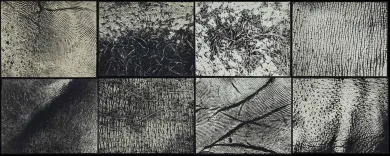
The (legal) person and the legal form. Chapter II
8, 12, 15 January, 2026 – 16:00 to 19:00
As part of the Studies Constellation, the Study Directoship’s annual fellowship, art historian and theorist Sven Lütticken leads the seminar The (Legal) Person and the Legal Form: Theoretical, Artistic, and Activist Commitments to foster dialogue and deepen the hypotheses and questions driving his research project.
This project, titled Unacting Personhood, Deforming Legal Abstraction, explores the dominance of real abstractions—such as exchange value and legal form—over our processes of subjectivation, and asks how artistic practices can open up alternative ways of representing or performing the subject and their legal condition in the contemporary world.
The seminar consists of eight sessions, divided into three chapters throughout the academic year. While conceived as non-public spaces for discussion and collective work, these sessions complement, nourish, and amplify the public program of the Studies Constellation.
In this second chapter of the seminar, the inquiry into the aesthetics and politics of legal form continues with three sessions that pick up the discussions held in Chapter I but propose new lines of flight. The first session focuses on international law via the writings of the British author China Miéville, which allows us to reconsider the notion of the legal form –following Evgeny Pashukanis— and, through it, a variety of (people’s) tribunals. While the crucial concept of the legal person –as the right-holder central to the form of law— was debated in Chapter I, the second session focuses on attempts to extend personhood not (just) to corporations, but rather to nonhuman animals or ecosystems. Finally, the third session poses the question: how can groups and networks use officially recognized organizational forms (such as the foundation or the cooperative) and/or use a collective persona (without necessarily a legal “infrastructure” to match) to act and represent themselves?
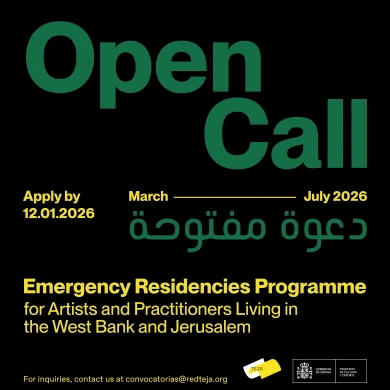
TEJA 2026. Open Call for Emergency Art Residencies
Proposal submission until 12 January, 2026
TEJA / Red de espacios culturales en apoyo a situaciones de emergencia [Network of Cultural Spaces in Support of Emergency Situations] has the mission to promote transnational cooperation by offering temporary art residencies to artists and cultural practitioners who find themselves in complex socio-political situations in their countries of origin. During their stay in Spain, residents receive accommodation, legal and psychological counseling, and access to a network of organizations and professionals with whom they can share, develop, and continue with their creative projects. The goal is to provide a safe and stimulating environment where artists can continue their work despite adverse circumstances and generate dialogue spaces that ensure freedom of expression through joint activities both in Spain and with international collaborators.
During 2026, TEJA hosts three new residencies, each lasting three months, dedicated to supporting artists and cultural practitioners residing in the West Bank and Jerusalem. In addition, in the second half of the year, TEJA hosts three additional residencies for Gazan artists, which are offered by invitation (as Spain is currently unable to facilitate evacuations from Gaza, these invitations are coordinated through France). These residencies aim to provide a stable, creative environment and foster artistic exchange in the face of ongoing adversities. Through this new program, TEJA reaffirms its commitment to amplifying Palestinian voices and empowering artists as they navigate these turbulent times.
The selection is carried out by the TEJA network in close collaboration with each hosting partner. This year the hosting partners are: La Escocesa (Barcelona), hablarenarte / Planta Alta (Madrid), Espositivo (Madrid), Institute for Postnatural Studies (Madrid), Casa Árabe (Córdoba). The selection prioritizes the artist’s personal and professional situation first, and then the alignment with the practices and themes of the hosting spaces. Proposal submission deadline is January 12th, 2026, 23:59 h.

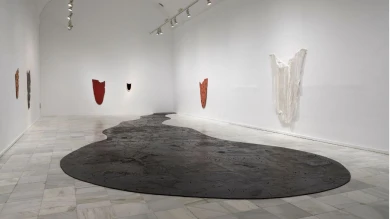
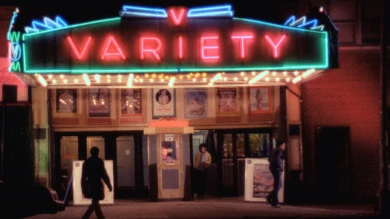
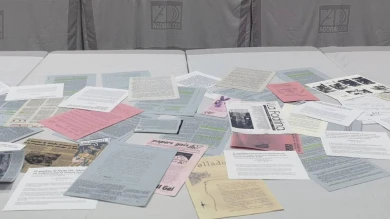
![Miguel Brieva, ilustración de la novela infantil Manuela y los Cakirukos (Reservoir Books, 2022) [izquierda] y Cibeles no conduzcas, 2023 [derecha]. Cortesía del artista](https://recursos.museoreinasofia.es/styles/small_landscape/public/Actividades/ecologias_del_deseo_utopico.jpg.webp)
![Ángel Alonso, Charbon [Carbón], 1964. Museo Reina Sofía](https://recursos.museoreinasofia.es/styles/small_landscape/public/Actividades/perspectivas_ecoambientales.jpg.webp)